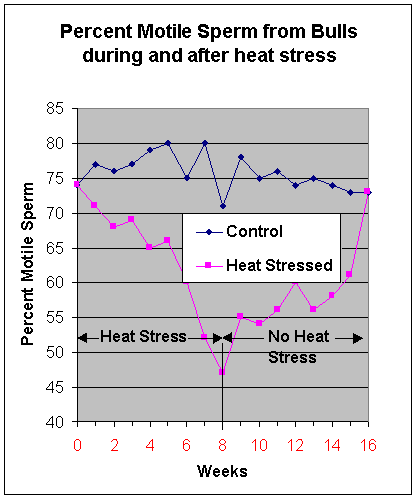
Agricultural News
Breeding Soundness Exams are Important After the Hot Summer
Tue, 27 Sep 2011 13:05:23 CDT

As everyone in Oklahoma is already aware, the summer of 2011 was a record-setter. Many areas of the state had 70 or more days with over 100 degrees. According to Dr. Glenn Selk, Oklahoma State University Emeritus Extension Animal Scientist, heat stress will undoubtedly take a toll on the spring and summer breeding season that has already occurred. However, those herds with fall-calving and fall breeding seasons may also feel the effects of last summer.
Before the fall breeding season begins, producers will want to contact their local veterinarian and schedule a time for the bulls to receive a "Breeding Soundness Exam." This is an excellent practice each year preceding the breeding season, but could be most important in years following very hot later summers. The extreme and persistent heat of this summer may have "heat-stressed" bulls as late as early September. Bulls that have been heat-stressed will require at least 2 months (from the conclusion of the stress) to fully recover.
Oklahoma scientists (Meyerhoeffer, et al 1978) placed bulls in controlled environments of 95 degrees F for eight hours and 87 degrees for the remaining 16 hours, while similar bulls were placed in environments of a consistent 73 degrees F. These treatments were applied to the bulls for eight weeks, and then all bulls were exposed to the 73 degrees environment for another eight weeks. During the treatment, the heat stressed bulls had rectal temperatures 0.9 degrees F higher than non-stressed bulls. The percentage of motile sperm cells decreased significantly in the stressed bulls by two weeks of heat stress.
Examine the graph above that illustrates sperm motility in bulls that were heat stressed and then allowed to return to a thermo-neutral environment. As you can tell, the bulls returned to normal sperm motility after 8 weeks. This coincides with the length of time needed for the complete development and maturation of new sperm cells in the testes. If bulls were ill or injured during this time, the elevated body temperature may have lingered causing further delay in the return to normal.
Assessing the "breeding soundness" now, would allow producers to make adjustments in the bull battery before the critical first weeks of the breeding season. If a bull is likely to be a poor performer, the producer has time to locate a replacement and not delay the start of next years' calf crop.
Our thanks to Dr. Glenn Selk for providing this article as part of the Cow-Calf Corner Newsletter, which is produced by Dr. Selk and Dr. Derrell Peel most Mondays.
WebReadyTM Powered by WireReady®NSI
Top Agricultural News
More Headlines...




















